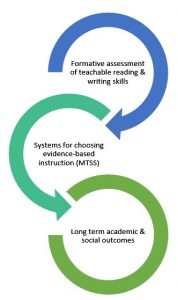I research the component skills underlying reading, writing, and language development as a mechanism for selecting more effective and equitable instruction. I created the Writing Architect, a tool that connects research-based instruction with 5 high leverage skills. I coordinate assessment decisions for effectiveness, equity, and implementation.
I research the use of reliable formative assessment tools to connect evidence-based instructional practices with the needs of individuals and groups of students. I do this through:
- Identifying the teachable components of reading and writing achievement
- Creating assessments that efficiently identify student strengths and weaknesses
- Examining schools’ decision processes for implementing evidence-based instruction
Current Projects
MA in Special Education Fellowship
We received a training grant from the U.S. Department of Education, Office of Special Education Programs to cover tuition for working professionals to get their masters’ degree and re-specialization in special education while continuing to work in a school. This unique program was designed to train two different types of educators together in some shared coursework and shared monthly workshops regarding important topics in education. The two groups are teachers seeking re-specialization in special education and those seeking an Education Specialist degree in School Psychology. Through these shared experiences in Project Hi2LD, we hope that special education teachers and school psychologists will form stronger teams to improve outcomes for students with and at-risk for disabilities in schools.
Creating an Early Literacy Assessment System
In 2019 and 2020, Drs. Truckenmiller and Cho served as principal contributors to an extensive guidance document that was commissioned by the Michigan Department of Education. This document was intended to provide guidance to school districts on ways to re-conceptualize assessment use in ways that will equitably improve early reading achievement and therefore improved life outcomes for all students in Michigan.
Specifically, Drs. Truckenmiller and Cho wrote Section III-4 that provides concrete examples of the research-based information that assessments provide and how that information is effectively connected with instructional decisions in schools.
Exploring Writing in Response to Text Using the Writing Architect
In most jobs, college, and civic life, we need to write to convey the information that we have learned from reading text or other sources. There are many factors that contribute to successfully learning to write, including the coordination of multiple language skills and cognitive processes involved in written composition, a rich background knowledge of the topic, and excellent instruction from skilled teachers who provide effective feedback and evidence-based instructional materials. Unfortunately, there are many structural barriers that prevent students from developing these written composition skills that are so vital for many careers and also provides a method for their voices to be heard. Given these barriers and the complex nature of written composition development, students vary widely in their writing skills and schools need tools to determine students’ current development and best use limited instructional time to move student learning forward. At MSU, Dr. Truckenmiller developed a tool that highlights students’ strengths and weaknesses on the teachable and high-impact components of writing. In the current research project, Dr. Truckenmiller’s team is analyzing the data from students in grades 3 through 8 on multiple components of writing to determine which components are most beneficial for guiding their teachers’ instruction.
The Writing Architect was developed as a web-based assessment of students’ written composition. There is also a computer-based scoring system that assists educators in using enhanced curriculum-based measurement metrics and a variety of other scores. The Writing Architect currently contains 16 passage-based informational writing prompts, with 3 to 4 forms per grade level. Narrative and persuasive prompts were also added by Dr. Gary Troia as part of his IES-funded study to explore the relation of classroom instructional practices with writing development.


